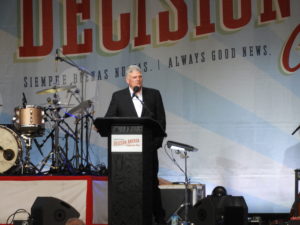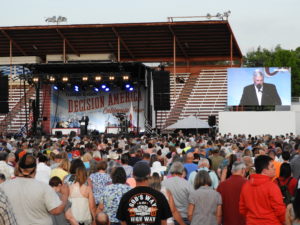 Driving to work a few weeks ago, I was surprised to see billboards announcing a visit to my neck of the woods by Franklin Graham, son of his recently departed father Billy. An online search found the website of his Decision California tour, intending to bring the Gospel to a state which, as Graham made clear at the outset of his talks, had given itself up to a godless secularism. Though I didn’t share Graham’s concern over the state’s spiritual welfare, I knew I didn’t want to miss his visit. Growing up in an evangelical community in the state’s Central Valley, I had been raised to think of the elder Graham as a minister of God beyond reproach. I was curious about what had become of his ministry in the hands of his son Franklin.
Driving to work a few weeks ago, I was surprised to see billboards announcing a visit to my neck of the woods by Franklin Graham, son of his recently departed father Billy. An online search found the website of his Decision California tour, intending to bring the Gospel to a state which, as Graham made clear at the outset of his talks, had given itself up to a godless secularism. Though I didn’t share Graham’s concern over the state’s spiritual welfare, I knew I didn’t want to miss his visit. Growing up in an evangelical community in the state’s Central Valley, I had been raised to think of the elder Graham as a minister of God beyond reproach. I was curious about what had become of his ministry in the hands of his son Franklin.
The event was held at the county fairgrounds, and I was able to get there just as Jeremy Camp concluded his Christian contemporary pop musical introduction and Mr. Graham strode to the stage to address the multitude seated in camping chairs. It wasn’t as big a crowd as the stadiums that his father used to fill, but there were probably at least two or three thousand in attendance. Graham, following a template similar to his talks elsewhere in the state, began by asking those in attendance to pray for the spiritual enlightenment of the state’s leaders, starting with Governor Brown, a request that a number of people around me honored with fervent utterances until Graham concluded with his own prayer. He then called on his Christian listeners to run for office, including for local school boards, to reverse the godless secularism which taken over California. I knew that he had been making this call elsewhere, but I hoped in this case that it wouldn’t bear fruit. Being involved with school governance in my day job, this was a development almost certain to bring headaches to my professional life if it came to pass.
 Graham then moved on to what has always been the core mission of his ministry, the salvation of souls. As with his father, his message was blunt and unsparing. We are all guilty of sinning against God, Judgment Day is at hand, or at least a lot closer than we think, and the only path from eternal damnation is to ask Jesus Christ for forgiveness and accept Him as Lord and Savior. This is a common sermon to hear in church pulpits, but it’s quite another experience to hear it in the deep baritone of a Graham, with just a touch of a Carolina drawl. It is the kind of voice you might expect if God Himself were to come down and make His appeal. I closed my eyes for some of it and felt as if I had traveled back in time to one of the elder Graham’s many crusades as far back as the 1940’s. The sense of time travel was all the greater when, as Graham asked those who wished to accept Christ to stand where they were, musicians on the stage gently sang the verses of “Just As I Am,” the hymn that by far has accompanied more altar calls than any other in the history of American evangelism. I smiled a little when I heard it. Some things never change.
Graham then moved on to what has always been the core mission of his ministry, the salvation of souls. As with his father, his message was blunt and unsparing. We are all guilty of sinning against God, Judgment Day is at hand, or at least a lot closer than we think, and the only path from eternal damnation is to ask Jesus Christ for forgiveness and accept Him as Lord and Savior. This is a common sermon to hear in church pulpits, but it’s quite another experience to hear it in the deep baritone of a Graham, with just a touch of a Carolina drawl. It is the kind of voice you might expect if God Himself were to come down and make His appeal. I closed my eyes for some of it and felt as if I had traveled back in time to one of the elder Graham’s many crusades as far back as the 1940’s. The sense of time travel was all the greater when, as Graham asked those who wished to accept Christ to stand where they were, musicians on the stage gently sang the verses of “Just As I Am,” the hymn that by far has accompanied more altar calls than any other in the history of American evangelism. I smiled a little when I heard it. Some things never change.
I left right after the altar call so as not to get caught in a traffic jam departing the fairgrounds. As I eased my way though the maze of parked vehicles, I felt some concern for those who had stood to receive blessings that evening. Most of us, in one way or another, carry around inside of us a sense of guilt or some other spiritual longing, and the prospect of release from such a burden, especially in a setting as dramatic as a Graham crusade, has a powerful appeal. I wondered, though, how they would feel the next day, or in the weeks and months thereafter, when the emotions of the evening passed and Graham with his entourage had long since moved on to the next crusade. The letdown after conversion experiences can be painful, and, as I found in similar situations when I was younger, they are not a permanent solution to life’s discontents. The evangelicalism exemplified by the Graham ministries may save souls, but when it comes to our time on earth, it often has few answers about what’s next.


